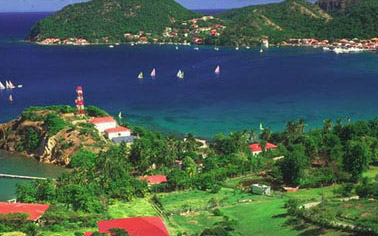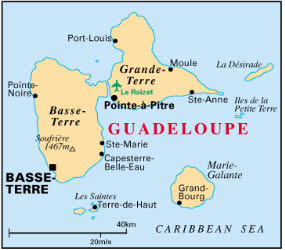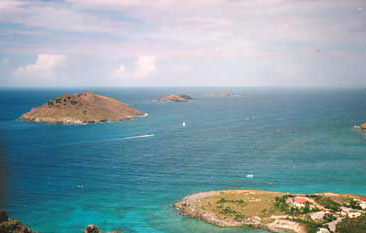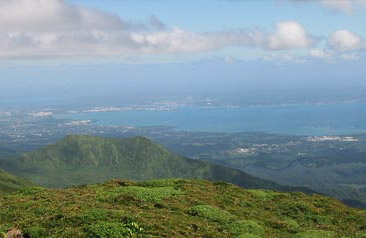GUADELOUPE
FAST FACTS
Area: Total: 1705 sq km (658.3 sq miles). Basse-Terre: 839 sq km (324 sq miles). Grand-Terre: 564 sq km (218 sq miles). Marie-Galante: 150 sq km (58 sq miles). La Désirade: 29.7 sq km (11.5 sq miles). Les Saintes: 13.9 sq km (5.4 sq miles). St Barthélemy: 95 sq km (37 sq miles). St Martin (which shares the island with St Maarten, part of the Netherlands Antilles): 88 sq km (34 sq miles).

Population: 405,500 (as of 2008)
Population density: 249.1 per sq km.
Capital: Basse-Terre
Geography: Guadeloupe comprises Guadeloupe proper (Basse-Terre), Grande-Terre (separated from Basse-Terre by a narrow sea channel) and five smaller islands. Basse-Terre has a rough volcanic relief whilst Grande Terre features rolling hills and flat plains. All the islands have beautiful white- or black-sand palm-fringed beaches. There are also many lush mountainous areas with stunning and unspoiled tropical scenery.

Climate: Warm weather throughout the year with the main rainy season occurring from June to October. Showers can, however, occur at any time although they are usually brief. The humidity can be exceedingly high at times.
Required clothing: Lightweights with warmer top layers for the evenings; shower proofs
are advisable.
Government: Guadeloupe is an Overseas Department of France and as such is an integral part of the French Republic.
President: Jacques Gillot.
Language: The official language is French. The lingua franca is Creole.
Time: GMT - 4 (ECT)
Religion: The majority are Roman Catholic, with a minority of predominantly Evangelical protestant groups.
Electricity: 220 volts AC, 50Hz.
Currency:
The Euro is the official currency for the French Overseas Departments, French Guiana, Guadeloupe, Martinique and Réunion.

Currency exchange: All the major French banks are represented on the island. ATMs are available.
Credit & debit cards: MasterCard, Diners Club, American Express and Visa are accepted. Check with your credit or debit card company for details of merchant acceptability and other services that may be available.
Travelers checks: Accepted in most places. Their use may qualify visitors for discounts on luxury items. To avoid additional exchange rate charges,
travelers are advised to take travelers checks in Euros. US and Canadian Dollar
checks are also accepted in some places.
Banking hours: Mon-Fri 0800-1200 and 1400-1600, Sat 0800-1200 (closed Wednesday afternoons).
COMMUNICATIONS
IN GUADELOUPE
Telephone: IDD is available. Country code: 590. Good internal network. There are no area codes.
Phone cards (télécartes) are necessary to make calls from public telephones.
Mobile telephone: GSM 900 network. Handsets can be hired at the airport (cost: €46 for one week, plus deposit of €153). Network providers include France Télécom and Améris. Coverage extends throughout the French West Indies and in French Guiana. St Martin and St Barthélemy also have digital analog networks, system B, operated by St Martin Mobiles (website: www.stmartinmobiles.com). These analog networks are compatible with most US handsets, which can be activated on the island by
dialing 0 or by registering online.
Internet: Local ISPs include wanadoo (website: www.wanadoo.fr) and Antilles-net (website: www.antilles-net.com).
Post: Airmail takes about a week to reach Europe.

Press: Newspapers are all in French. The main daily is France-Antilles.
HEALTH INFO
A yellow fever vaccination certificate is required by
travelers over one year of age arriving from an infected or endemic zone within six days.
Food & drink: Mains water is chlorinated and whilst relatively safe, may cause mild abdominal upsets. Bottled water is available and is advised for the first few weeks of stay. Drinking water outside main cities and towns may be contaminated and
sterilization is advised. Milk is pasteurized and dairy products are safe for consumption. Local meat, poultry,
seafood and fruit are generally considered safe to eat.

Other risks: Bilharzia (schistosomiasis) is present. Avoid swimming and paddling in fresh water. Swimming pools that are well maintained and chlorinated are safe. Hepatitis A can occur.
The sap of the manchineel tree is toxic and causes burns to the skin. Travelers
should avoid contact with its leaves and fruit, and should not stand under the tree when it is raining. These trees, which look similar to apple trees, are often marked with a red sign on the trunk.
Health care: Health care is of a good standard, but health insurance is advisable to cover costs as the reciprocal health agreement between the UK and France may not apply in Guadeloupe.


